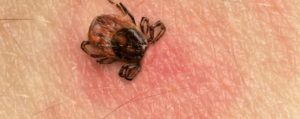 HYANNIS – Even when as small as poppy seeds, ticks pack a punch.
HYANNIS – Even when as small as poppy seeds, ticks pack a punch.
Worldwide, they are the No. 2 living organism that spreads disease to humans, said Patrick Cahill, MD, infectious disease specialist with Cape Cod Healthcare. (Mosquitoes still take first place.)
By now, most Cape Codders are familiar with the risks of the corkscrew-shaped bacteria that causes Lyme disease and is passed by the deer tick. Barnstable County averaged 175 reported cases of Lyme annually between 2000 and 2015, according to the federal Centers for Disease Control, peaking in 2012 with almost 300 cases. Many more cases go unreported or are too mild to cause symptoms. One in three local deer ticks is estimated to be carrying Lyme, according to Dr. Cahill.
But other tick-borne diseases are also here – babesiosis, anaplasmosis, tularemia, Powassan – and can have dire consequences. The best defense is education and prevention, Dr. Cahill said.
To that end, he recently presented a Cape Cod Healthcare public forum about tick-borne diseases, their treatment and how to avoid an encounter with the pesky arachnids that spread them. His key message: “Locally, we should always have Lyme and these other tick-borne diseases on the radar. My advice: Even if you have an inkling suspicion, a short course of treatment will probably be effective.”
Here are some key take-aways from Dr. Cahill’s session:
- Get to know local ticks. The most visible tick on the Cape and Islands is the American dog tick – the ones you find on Rover after a walk in the woods. They can transmit tularemia and Rocky Mountain spotted fever but tend to be less risky because they are more likely to be discovered than their smaller cousins. Black-legged or deer ticks are about the size of the “D” on a dime and can transmit anaplasmosis, babesiosis, Lyme and Powassan. Lone star ticks carry erlichiosis, tularemia and STARI (Southern Tick Associated Rash Illness) that is similar to Lyme. Need help with identification? Go to the University of Rhode Island’s TickEncounter Resource Center for photos.
- Understand the risks of tick-borne illnesses. You could get bitten by a tick and have no consequences at all. Other people have mild to severe reactions. Anaplasmosis is caused by a bacteria that attacks the white blood cells. Powassan is a virus that, while rare, can lead to fatal encephalitis and has no known treatment. Babesiosis is actually caused by a parasite that can cause severe anemia or kidney failure. Lyme disease can lead to meningoencephalitis, nerve damage, heart inflammation and arthritis. Bottom line: a tick bite could turn out to be nothing or it could threaten your life.
- Know the symptoms of a tick bite. While some people are bitten by ticks without any noticeable side effects, others feel flu-like symptoms – fever, chills, aching joints – that without treatment can progress into something more serious. It’s rare, but people bitten by lone star ticks have also developed red meat allergies. Most tick-borne illnesses take 24 to 36 hours to get into your blood stream after a tick bite. Powassan, however, can take as little as 15 minutes. Some infections are accompanied by a rash, like the common bullseye rash of Lyme disease. But even patients with Lyme may not always have a rash, making diagnosis more difficult and requiring lab tests. Dr. Cahill recommends starting treatment even if there’s a suspicion of tick-borne illness.
- If in doubt, seek treatment. It’s important if you have symptoms and have been outdoors, to get medical help. To remove a tick from your body, grasp it with tweezers as close to your body as possible and pull straight up. But don’t get rid of it! Drop it into a plastic bag and seal it. The University of Massachusetts Amherst’s Laboratory of Medical Zoology TickReport Program will test it and analyze any diseases it was carrying. A grant from Cape Cod Healthcare has reduced the cost to $15 for Cape Codders.
Treatment for most tick-borne diseases includes a course of antibiotics such as doxycycline (for Lyme and Anaplasmosis) or a combination of atovaquone and azithromycin for Babesiosis. Some people may require more than one course of antibiotics. Dr. Cahill, however, worries about the effects of overuse of antibiotics on human immune systems and cites studies showing that long-term Lyme treatment with antibiotics is ineffective. Post-Lyme issues may be caused by the reaction of your immune system; it does not mean there is still bacteria in your body, he says.
- Prevention, prevention, prevention: The best offense is a good defense. So far, there is not a vaccine for Lyme or other tick-borne illnesses. LYMERix, marketed from 1998-2002, was withdrawn from the market due to side effects and other concerns.
That means, if you plan to be outdoors, you need to take measures against ticks. (And don’t think they are all in the woods. Lone star ticks have reportedly been picked up from driveways.) Here’s advice from the Barnstable County Health Department and the CDC:
- Use repellants. Use products containing DEET (N,N-diethyl-meta-toluamide) on your skin and products with permethrin (also used to treat lice) on clothing. You can apply it yourself or buy permethrin-infused clothing through outdoor suppliers. Children should not handle repellents. Adults should apply it to their own hands first and then spread on children’s skin. The CDC and the U.S. Environmental Protection Agency say DEET products are safe for children and women who are pregnant or lactating if they are used with precautions.
- Wear protective clothing. Wear long sleeves and tuck your pants into your socks in wooded areas. Wear light colors so you can see ticks more easily.
- It’s a good time to check your hair and body for hangers-on. If you have a partner who can help, all the better.
- Toss your clothes in the dryer. Tumble dry on heat for 20 minutes. That should kill any ticks attached to your clothing.























